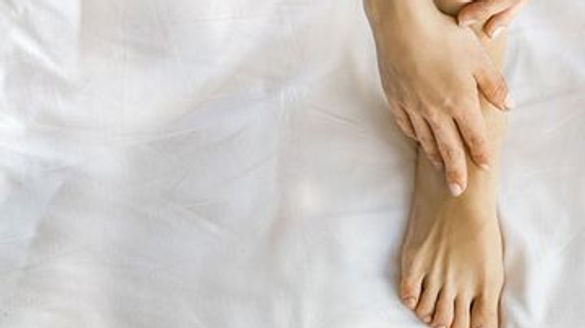Other Conditions
Foot Conditions in Calgary
Heritage Family Foot Clinic offers treatments for foot conditions in Calgary. Are you dealing with painful foot conditions in Calgary? From bunions and heel pain to warts, we can help you with everything in between!
You rely on your feet every day. Ensure they are taken care of well. If you’ve noticed symptoms like those described on this page, do not hesitate to book an appointment. Heritage Family Foot Clinic can diagnose the issue and come up with a proactive course of treatment. Everyone is subject to the occasional aches and pains and sores, but if you’re encountering leg or foot pain on a frequent basis, it may be time to see a professional.
Corns and Calluses
If subjected to repetitive pressure, the skin on your foot will begin to harden. When this thickened skin becomes dead tissue, the layer beneath can become irritated and sore. Corns form on toes; calluses are found on the bottoms of feet. There are a number of products available on the market to treat the effects of each. A podiatrist can also surgically reduce larger corns and calluses.

Custom Orthotics
Poor foot structure is responsible for most foot problems we see. Even the smallest misalignment can cause a great deal of pain. Orthotics are medical shoe inserts designed to support and reposition the heel, arch, muscles, ligaments, tendons, and bones.

Haglund’s Deformity
This painful condition occurs when the bony section of your heel becomes enlarged and is marked by severe pain, swelling, and redness. Relieving pressure from the heel bone may require anti-inflammatory injections, soft-tissue massage, custom orthotics, or even surgery.

Flatfeet
People with flatfeet lack the upward curve in the middle of the foot most of us take for granted. An underdeveloped arch can lead to achy, swollen feet, and back or leg pain. Even if you do have flatfeet, you may not be experiencing any of the symptoms mentioned above. However, flatfeet can contribute to other conditions such as heel spurs, knee pain, and arthritis. We offer orthotic devices, supportive shoes, stretches, and physical therapy to help improve the situation.

Diabetic Foot Care
People with diabetes are more susceptible to circulation problems and infections, which is a cause for concern as it relates to the feet. If you have diabetes, it is especially important to monitor the condition of your feet for any signs of redness, blisters, cuts, or bruising. Proper washing and nail trimming are just some of the proactive measures you can take to help protect your health. Unfortunately, once infection settles into the foot, amputation becomes the only alternative. If you have diabetes, consult with us.

Hammer Toe Treatment
This deformity causes toes to curl or bend as a result of a muscle imbalance between the tendons. It generally worsens over time. If it goes untreated, the toe may not be able to move on its own. Treatments vary depending on the severity and may involve padding, new shoes, or even surgery.

Heel Spurs
Calcium deposits underneath the heel can cause the bone to stick out, which irritates the plantar fascia ligament, causing chronic pain. If heel pain is an issue, contact our clinic for a thorough examination.

Plantar Warts
These small, fleshy growths show up on the bottom of the foot after contact with human papillomavirus. Although there are many over-the-counter-treatments available at your local drug store, a podiatrist can assess the situation to determine a more effective treatment. Your doctor may recommend freezing, laser treatment, minor surgery, or prescription medications.

Morton’s Neuroma
This condition involves a thickening of the tissue surrounding the nerves leading to the toes. It causes discomfort along the ball of your foot and may feel like you have a small rock stuck in your shoe. In order to verify this condition, you may need to undergo an X-ray or an ultrasound to rule out other possibilities. Custom orthotics, new shoes, cortisone injections, and anti-inflammatory medications will likely be explored before any type of surgery option is considered.

Toenail Fungus
If you spot white or yellow spots under the tip of your toenail, it could be the onset of an infection known as toenail fungus. There are different types of fungal infection (with Athlete’s Foot being the most recognizable). Although treatment isn’t always necessary, if you notice scaling under the nail, white or yellow streaks, a foul odour, or crumbling, flaking areas on the nail surface, you should book an appointment to have it checked out. If ignored, some infections can lead to the loss of the nail.

Tendonitis
Pain from inflamed foot tissue around your tendons is a common cause for foot and ankle pain. It can occur suddenly, or gradually develop over time. Tendonitis symptoms include stiffness, swelling, weakness, and tenderness. If you’re feeling any discomfort in the arch of your foot, the back of your ankle, or in your Achilles tendon, it’s advised that you schedule an appointment to see us. Tendon injuries tend to only get worse if ignored.

Stress Fracture
The appearance of tiny cracks in your foot bones are frequently brought on by repetitive forces bearing down on these weight-bearing bones and the supporting muscles in your feet. A podiatrist can diagnose and make recommendations for non-surgical treatments. If adjustments to your routine (activity modification and customer orthotics) don’t seem to work, surgery to help support your foot or shin bones may be recommended.

Extracorporeal Shockwave Treatment
Shockwave therapy is a non-invasive method that uses pressure waves to treat conditions like degenerated tendons (Achilles tendonitis) and heel pain. A non-invasive probe is used on the skin, which will create energy and shock waves to help induce healing. This can be an alternative to surgery; however, treatment responses may vary from person to person.


